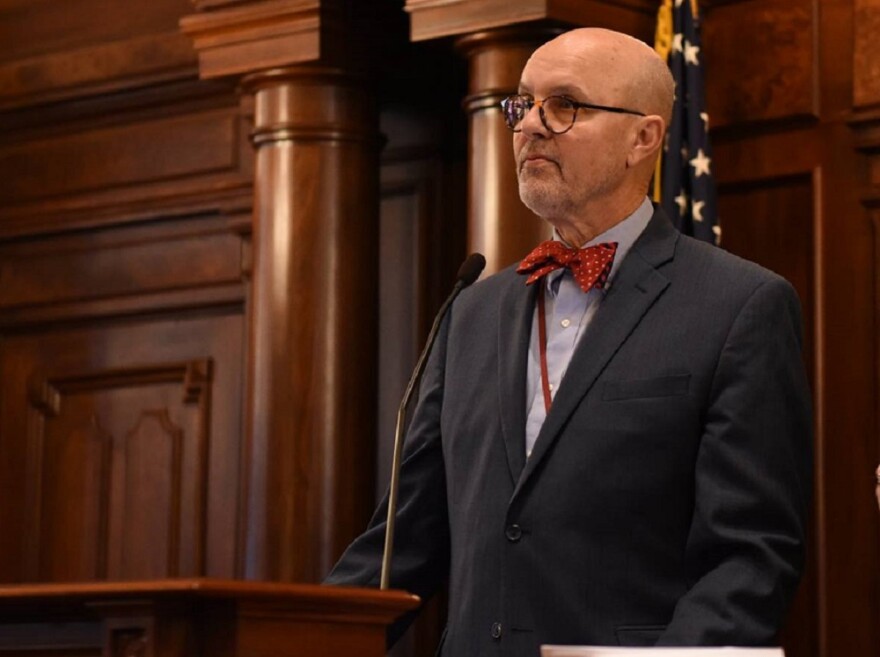In the days following the end of the session, Democratic state Sen. Dave Koehler of Peoria looked back at the tense spring session.
A $3 billion deficit in the state budget caught the attention of the Illinois legislature throughout the session. This came as the federal COVID relief funds expired this year, and a new administration began to threaten cuts of federal funding due to Illinois’ immigration policy.
Koehler, the Assistant Majority Leader in the Senate, said the budget was a difficult challenge not only since federal funds were unreliable, but also because the state had not collected as much revenue as in prior years.
“We had to look at budget cuts, which is always a tough thing to do,” Koehler said. “With the uncertainty in the federal government, that made it particularly hard, because the federal government is a partner, whether it's education funding, whether it's a health care funding, whether it's highways and roads. The federal government is a partner in just about everything that the state government does.”
Even with a budget passed, Koehler said there is still uncertainty about whether the state will be stable if federal funds were suddenly cut, especially as the U.S. Senate decides in the coming weeks to vote on the reconciliation bill.
“If the U.S. Senate decides to look at the what the constituents that sent them there want and instead of what Donald Trump wants, then maybe we can get back to some kind of a budget that's not going to hurt everybody back home,” Koehler said.
Spring session passed legislation
Koehler said he had some key victories in this session, such as the passing of his Illinois Prescription Drug Affordability Act.
It stopped pharmacy benefit managers, the middlemen between drug distributors and pharmacies, from steering services away from smaller, independent pharmacies. Pharmacy benefit managers gain a rebate when they steer people to a pharmacy they are affiliated with.
The bill would now require these companies to rebate the full cost of medication to pharmacies.
Koehler said banning this tactic will allow customers to have more choice and not be exploited by these companies.
“We're now saying in this bill, if you get a rebate as a PBM, you now have to share that 100% with the end user, with the sponsor, the plan sponsor, with the individual, and so no more playing these games where you extract all these profits out of the system,” Koehler said.
Koehler was helped to pass a bill, with co-sponsor, Democrat Rep. Sharon Chung, of Bloomington, to allow the Bloomington-Normal Water Reclamation District to accept wastewater and sell treated wastewater to companies within a 50-mile radius.
“Those machines get overheated, and they use the water to cool it,” Koehler said. "There's no good reason at all for taking water out of the Mahomet Aquifer, good clean drinking water, and trying to use it just to cool down computers that are using it for data processing.”
Koehler also praised the ban on carbon capture near the aquifer.
“We need to make sure that we protect clean drinking water,” Koehler said. “Water is such a valuable commodity. All you need to do is read about the problems out in the western part of the country, with the Colorado River running dry. Water is precious, and we need to make sure we protect our clean aquifers.”
Each of those bills have been sent to Gov. JB Pritzker.
Session disappointments
Koehler’s companion bill to the Drug Affordability Act failed to reach the finish line. The bill would have expanded access to the federal 340B program which requires drug makers to sell their drugs at a lower rate to hospitals and pharmacies serving rural or underserved communities.
The bill would have restricted companies limiting the number of pharmacies a hospital could refer a patient to.
Koehler said the bill was not called in House because there weren’t enough votes.
“The Big Pharma really targeted the house with all kinds of ads,” Koehler said. “ They did, mailers into the representatives' districts, that said ‘your representatives are trying to do something bad. They're going to cost you money. It was not factual, but it gave the result that they wanted, and that is to stop the bill.”
Immigration
Koehler also looked back at what he called a difficult decision to eliminate the Health Benefits for Immigrant Adults [HBIA] program which provided health care for noncitizen adults from 42 to 64.
The program faced a slew of criticism the past year after it greatly exceeded its original projected cost.
Republicans and some Democrats pointed the program out as the low-hanging fruit during a tough budget year.
Koehler said voting for the budget knowing the program was going to be cut was difficult. But Koehler said he felt better knowing that the health benefits for Illinois' immigrant seniors would not be eliminated.
“One is that I do support providing health care for seniors, even though they may not be here with documentation because it does affect our whole health care system. I mean, just because we may not provide health care for people doesn't mean they don't get sick,” Koehler said.
Koehler also pointed to the economic effect this could have on hospitals that serve immigrants and underserved communities, where many lack health insurance.
“But who picks up that cost? Well, it's anybody with health insurance,” Koehler said. “And so, there is a cost to the system, so why don't we just admit that upfront and provide what kind of care we can so that the burden isn't placed on everyone else, and it's unfair because some of the hospitals that treat the poor -- safety net hospitals, critical access hospitals, they end up having the burden placed on them, whereas wealthier hospitals and wealthier communities, they don't have to deal with it.”


